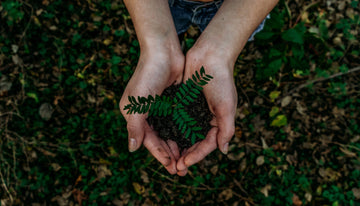Noah Buscher on Unsplash
We can have the best intentions of living more sustainably, but with our busy lives and so much information, it can be daunting to always make eco-friendly choices. But like nurturing any habit, sustainable living is a process, not a destination. You don’t have to commit to all of these ideas at once — rather, incorporate the easiest, low-cost tasks to live more sustainably everyday.
Go as plastic-free as possible
It’s no secret we have a plastic problem. Canadians throw away three million tonnes of plastic waste every year, and only 9 percent of it is recycled. Getting rid of single-use plastic items like shopping bags and straws is a good start, but here are some other simple swaps:
- In the bathroom: Use bars rather than liquid soap, and try shampoo and conditioner bars instead of bottles. Opt for clean beauty makeup brands with recyclable or biodegradable packaging.
- In the kitchen: Use beeswax wraps instead of plastic wrap to keep food fresh, shop for foods like nuts and grains at bulk stores and store them in glass containers, and try reusable snack and sandwich bags.
In the laundry room: Replace plastic detergent jugs with innovative eco-friendly alternatives.
Commit to sustainable fashion
Fast fashion — producing large volumes of clothing quickly — creates an immense amount of pollution and waste. Shifting to seasonless fashion and buying sustainably made pieces lessens the strain. Here’s how to help:
- Find out how it’s made: Look for explanations of how your garments are made and what materials are used (here at Daub + Design, we focus on low-impact processes with small batches and non-toxic materials).
- Choose fabrics wisely: Materials like recycled cotton, organic linen, bamboo, tencel, and rayon tend to be more sustainably made.
- Try a capsule wardrobe: Take a minimalist approach and pare back your closet to items you love and wear often. Donate or repurpose the rest.

Waste not, want not
Canadian households create millions of tonnes of waste a year, making us one of the top waste-producing countries in the world. So what can we do?
- Consider your paper towel use: Producing paper towels requires natural resources and creates harmful emissions. At the very least, use paper towels made from recycled materials, but better yet, reuse microfibre cloths for cleaning.
- Reduce food waste: Divert food scraps to a compost bin instead of the garbage. Have a garden? Compost is a nutrient-rich alternative to fertilizer. Find out how to start and what can be composted.
- Don’t forget about e-waste: Electronic devices should be disposed of differently, but prolonging the lifespan of our devices is better than upgrading frequently. You can trade-in devices with retailers, or donate old computers and phones.
Drink smart: Keep a reusable water bottle and travel mug for coffee or tea handy to cut down on plastic bottles and to-go cups.

